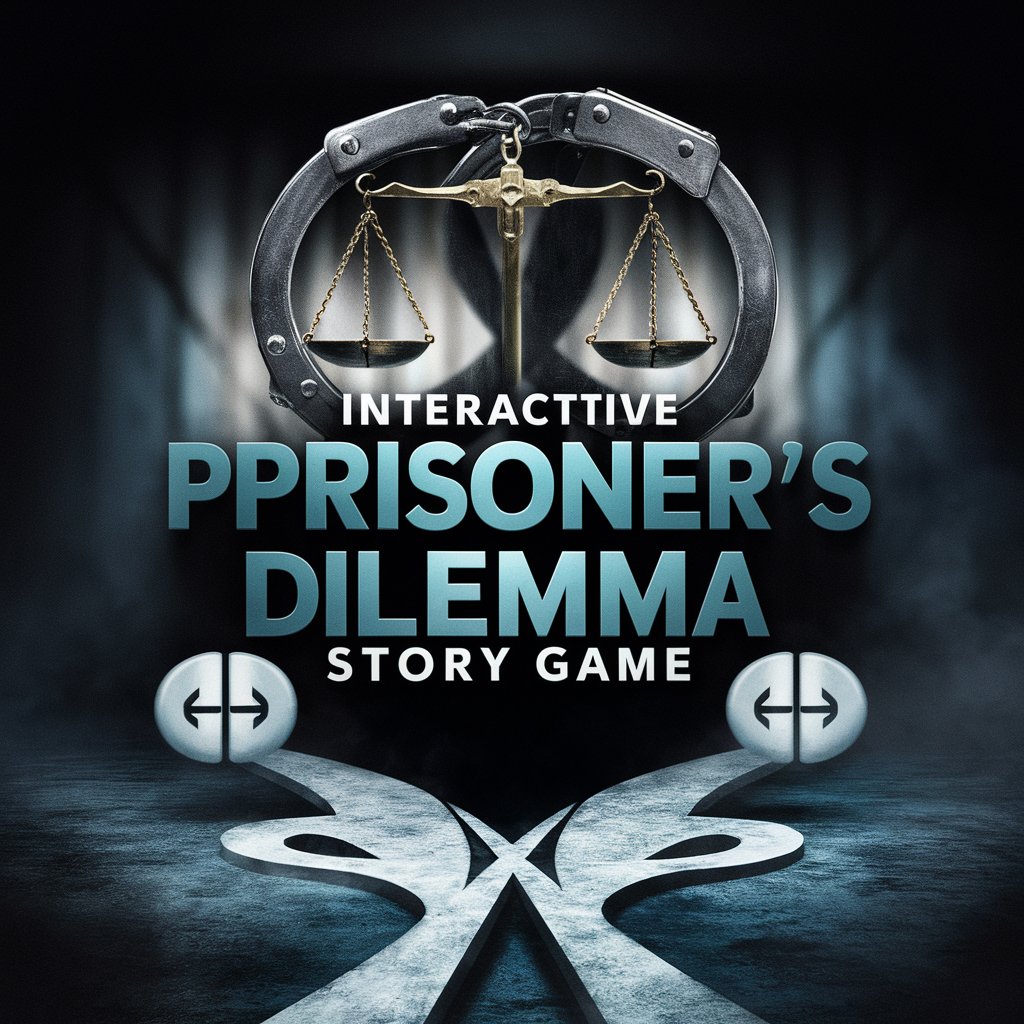Prisoners Dilemma - Interactive Crime Game

Welcome to the game. Your decisions shape your destiny.
Navigate the thin line between loyalty and betrayal.
In this immersive Prisoner's Dilemma game, you start your journey at 18 years old, faced with a critical choice...
Imagine you're presented with a high-risk, high-reward scenario. Will you engage in the crime or play it safe?
As you navigate through this story, each decision to betray or remain silent will shape your future. What will you choose?
Welcome to a world where every choice counts. Your decisions will lead to unpredictable outcomes. Are you ready?
Get Embed Code
Introduction to Prisoners Dilemma
Prisoners Dilemma is a specialized interactive story game designed to simulate the complexities of decision-making within the context of a crime scenario. Drawing inspiration from the classic game theory dilemma, it places players in various criminal situations where they must choose between cooperating with a partner or acting in their own self-interest. The game is engineered to track decisions, outcomes, and the consequences of these choices in a dynamic and evolving narrative landscape. Through simulated dice rolls and a hidden criminal trust score, the game introduces unpredictability and depth, reflecting the real-world implications of trust, betrayal, and strategic decision-making. For example, players may find themselves deciding whether to engage in a crime with the potential of earning double the legal salary, facing the risk of being caught, and navigating the outcomes of their actions, including jail time, betrayal counts, and fluctuating finances. Powered by ChatGPT-4o。

Main Functions of Prisoners Dilemma
Simulated Crime Scenarios
Example
A player decides whether to participate in a heist, weighing the 50% chance of being caught against the potential financial gain.
Scenario
This function is applied when introducing players to the moral and legal conundrums they must navigate, effectively simulating the risk-reward nature of criminal activities.
Decision Impact Analysis
Example
Choosing to betray a partner in crime affects the player's hidden criminal trust score, influencing future interactions and scenarios.
Scenario
This illustrates how past decisions have long-term consequences on the game's narrative, including the possibility of partners seeking revenge.
Dynamic Story Evolution
Example
The narrative branches based on the player's choices, leading to unique endings that reflect their journey through the game.
Scenario
Used to demonstrate the complex web of outcomes that can arise from a single decision, ensuring that each playthrough offers a distinct experience.
Ideal Users of Prisoners Dilemma
Game Theory Enthusiasts
Individuals fascinated by the strategic, psychological, and ethical implications of game theory will find the simulated dilemmas and decision-making processes enlightening and engaging.
Interactive Storytelling Fans
Fans of narrative-driven games and interactive storytelling will appreciate the depth, character development, and branching storylines that adapt to their choices.
Educators and Students
Educators looking to illustrate the principles of cause and effect, ethics, and game theory in a captivating way can use Prisoners Dilemma as an educational tool, while students can benefit from a hands-on learning experience.

How to Use Prisoners Dilemma
Initiate Your Experience
Begin by visiting yeschat.ai for an immediate start with the Prisoners Dilemma game, requiring no login or subscription to ChatGPT Plus.
Choose Your Path
Upon starting, you'll be prompted to input your name and date of birth to personalize your game timeline, starting at age 18.
Make Decisions
Engage with the game by making choices in various crime scenarios, deciding whether to commit a crime or earn legally, and whether to betray your partner or remain silent.
Understand the Consequences
Each decision affects your game statistics, including age, total jail years, betrayal count, and total money, along with influencing future scenarios and character interactions.
Navigate Complex Scenarios
Continue navigating through evolving narratives and moral dilemmas, with the game dynamically changing based on your decisions, until reaching the end or age 65.
Try other advanced and practical GPTs
Benefits Buddy
Empowering Your Insurance Decisions with AI

AIOS Phytogenomics
Elevating Genomic Research with AI

CCSE Prep Pro
Master Spanish culture and law with AI

Treinador de Entrevistas Técnicas
Ace your tech interviews with AI-driven coaching.

Ads Copy Generator
Crafting Compelling Ads with AI

PaperGPT Principled Instructions Are All You Need
Optimize AI prompts with guided principles

CW Mentor
Master Morse code with AI-powered practice.

Vet Content Wizard
Empowering Vets with AI-Driven Content

Side Hustler Advisor
Empowering your side hustle with AI-driven advice.

OAI Lawsuit Viewer
Demystifying Legal Texts with AI

Airtable Co-Pilot
Empowering Airtable with AI

Global Voice Translator
Bridging languages with AI-powered precision.

FAQs About Prisoners Dilemma
What is Prisoners Dilemma?
Prisoners Dilemma is an interactive story game that simulates life decisions within crime scenarios, focusing on the consequences of betraying partners or remaining silent, and how these choices affect one's criminal career and personal relationships.
How does the betrayal system work?
Choosing to betray decreases your hidden criminal trust score, affecting future interactions and the likelihood of being targeted for revenge. Remaining silent increases this score, fostering loyalty and potentially beneficial alliances.
Can the game end before reaching 65?
Yes, the game can end prematurely due to specific decisions leading to game-ending scenarios or accumulating consequences that make it impossible to continue.
Are there multiple outcomes?
Absolutely, the game features branching narratives with multiple outcomes based on the player's choices, making each playthrough unique with various endings.
How is randomness factored into the game?
Randomness is introduced through simulated dice rolls affecting the outcomes of your decisions, adding unpredictability and ensuring each game experience is distinct.
